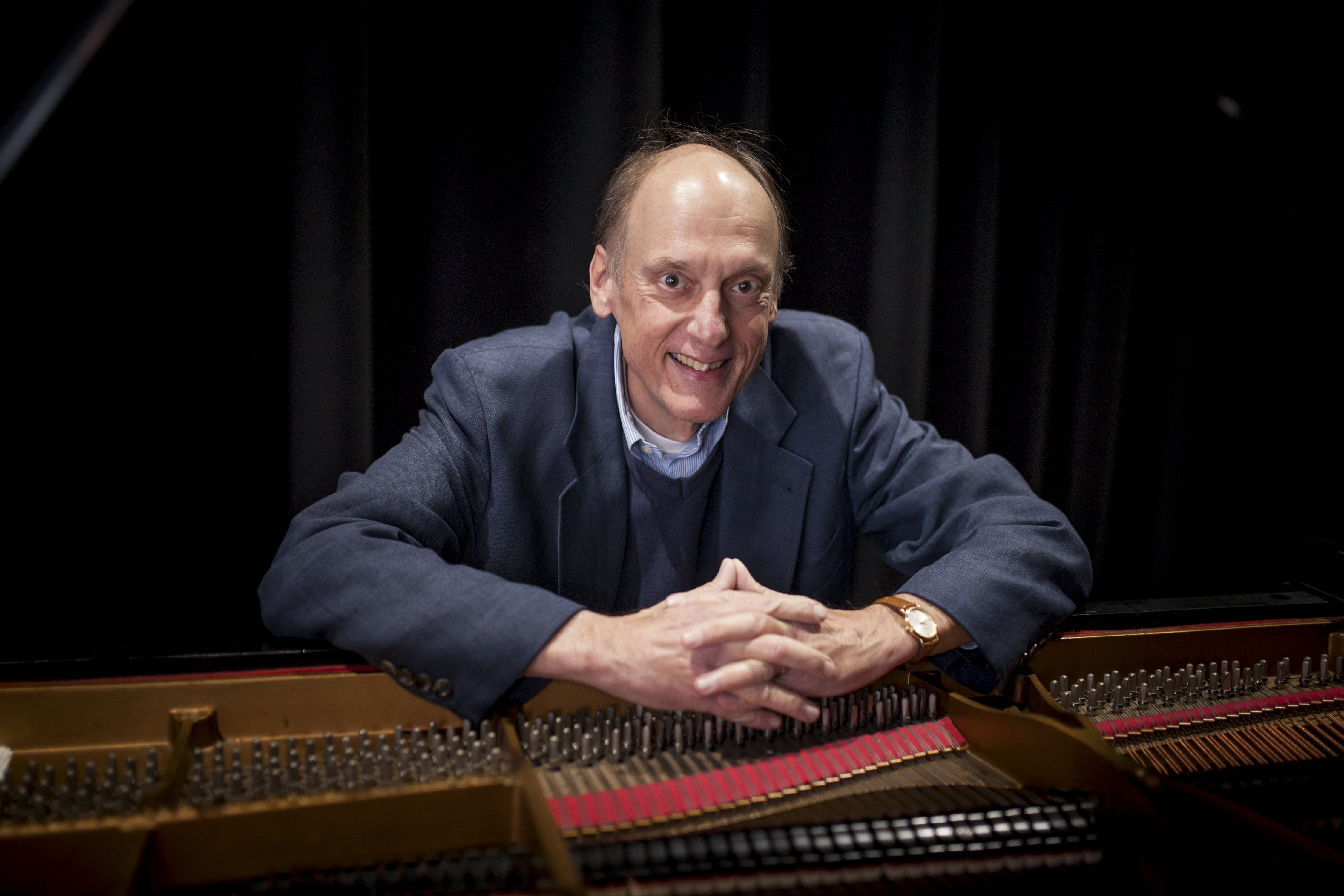Michael Johns : Sharing His Love Of Chamber Music With Beaufort
story by Carol Lauvray photos by John Wollwerth
Musician Michael Johns and his wife Michelle discovered Beaufort like so many of us who live here—they stopped in Beaufort while on vacation and fell in love with this picturesque coastal town and its friendly residents. Michael says that Beaufort’s reasonable cost of living and lack of traffic were additional enticements, so they purchased their home on Lady’s Island in Royal Pines 15 years ago and moved here permanently in 2011. And like so many who have relocated to Beaufort, Michael has found new direction in his life in our community. He explains that after moving to Beaufort, he was amazed to learn about the quality of music being presented in the “top-notch” USCB Chamber Music Concert Series. “To hear music of this caliber you’d expect to have to go to New York, Chicago or London—the USCB Chamber Music Concert Series is on the level of the Chamber Music Society of Lincoln Center!”
Music—A Lifelong Vocation and Avocation
Now retired from his professional performing career, Michael has found a new musical direction in Beaufort—immersing himself in the USCB Chamber Music Concert Series. He writes the program notes for each Chamber Music Concert and presents a pre-concert lecture to discuss the composers and music featured in each concert. These free, two-hour pre-concert lectures are presented in conjunction with both the University of South Carolina Beaufort (USCB) and the Osher Lifelong Learning Institute (OLLI) and are open to the public. Michael says the lectures are designed for music lovers. You do not need to be a trained musician to attend. “I select approximately 50 recorded musical excerpts from the upcoming concert and play them during the lecture, discussing what concert-goers can expect to hear that weekend. I want to help those who attend my lectures have a richer, deeper experience and be more engaged in the music when they attend one of the Chamber Music Concerts,” he says.
“Chamber music is different from other musical styles,” Michael explains. “What you experience with chamber music is a different inflection. Because it is acoustic music and involves a smaller number of instruments—perhaps a piano, violin and cello trio or string quartet—chamber music is more intimate and tender than the amplified music from a larger ensemble. Chamber music is like an intimate conversation. While listening to it, you tend to lean forward in your seat as if you’re overhearing a conversation, but when you’re listening to amplified music, you lean back and the music washes over you.”
A lifelong musician, Michael grew up in north-central Connecticut in a musical family. “Both my maternal and paternal grandparents had musical backgrounds. My grandmother was in the first class of the Curtis Institute of Music in Philadelphia, my parents met in their college band, and my dad was a public school music teacher in Manchester, Connecticut. Two of my three siblings also are musical—my brother played with the Metropolitan Opera for 45 years,” he adds.
Michael earned his Bachelors Degree in French Horn Performance from the New England Conservatory of Music in Boston and both his Masters Degree in Music History and Doctor of Musical Arts (DMA) Degree in French Horn Performance from Temple University in Philadelphia. He has performed on the French Horn with symphony, ballet and opera orchestras, in recital and chamber music. “I’ve played with the Delaware and Boston Symphony Orchestras and the Philadelphia Orchestra, and for Riccardo Muti, now the music director of the Chicago Symphony Orchestra, for Seiji Ozawa, the former music director of the Boston Symphony Orchestra, and for Arthur Fiedler, the long-time conductor of the Boston Pops Orchestra, as well as for many others,” says Michael. “As a freelance musician, I’ve worn many hats—I’ve done quite a lot of teaching, conducting, record producing and coaching chamber ensembles. I’ve taught children in community music schools, as well as college and graduate students, many of them specializing in playing the French Horn. I’ve also taught teachers in both music and education courses, including music appreciation and music history.”
Appreciating the Chamber Music Concert Series at USCB
The University of South Carolina Beaufort says this on its website about the Chamber Music Concerts: “Since 1979, the USCB Chamber Music Concert Series has presented internationally renowned artists, such as pianists Jean-Yves Thibaudet and Jeremy Denk, violinists Joshua Bell and Robert McDuffie, flautist Paula Robison, cellist Carter Brey, and the Brooklyn Rider, Emerson, Tokyo and St. Lawrence Quartets.”
“With Charles Wadsworth, credited by many with reviving interest in chamber music at Lincoln Center and at Spoleto Festivals in Italy and Charleston, and Edward Arron, director of the amazingly popular and critically acclaimed New York Metropolitan Museum chamber music series for 10 years, the quality of the musical selections and the talents of the artists have surprised and delighted audiences who come from throughout the region.”
Michael Johns will present the final free, two-hour pre-concert lecture for this Chamber Music season on Friday, April 20th from 10:00 AM to noon in the Sandstone Building in OLLI classroom 124 (prior registration through OLLI is requested). During this pre-concert lecture, Michael will present multiple recorded excerpts and discuss what concert-goers can expect to hear to help enhance their listening pleasure during the concert, which will be held that weekend on Sunday, April 22nd at the USCB Performing Arts Center at 5:00 PM. Michael says, “The repertoire for this concert includes music of polished elegance, grave serenity, and exuberant joy by Haydn, Chopin, Shostakovich, and Dvorak.”
Franz Joseph Haydn’s String Trio in G Major, Opus 53, No. 1 represents a relatively obscure instrumentation, playing in a classical style with great symmetry, balance and natural melodies that are tuneful (i.e., you can whistle them). It offers pleasing variety, but nothing shocking. Haydn’s music reflects graceful and uplifting feelings and is triumphant at times, however, to get to the triumph Haydn takes us through some stormy music,” Michael says.
Frederic Chopin’s Waltz in c-sharp minor for Solo Piano, Opus 64, No. 2 (1847) is Chopin’s most frequently performed and recorded waltz. It is a wistful and atmospheric piece in a minor key, according to Michael.
Dmitri Shostakovich’s Piano Quintet in g minor, Opus 57 was composed during World War II. “During his career, Shostakovich was in and out of favor with the Communist authorities and feared for his life, so he was careful not to anger them. This fiercely strong music communicates moments of deep, searing sadness. By interjecting dissonant notes and elements of sarcasm, Shostakovich conveys his contempt for Soviet ideology,” explains Michael.
Antonin Dvorak’s Piano Quintet in A Major, Opus 81 fills the entire second half of the concert. Michael says, “The music is jubilant, festive and joyful and is in the style of Dvorak’s New World Symphony.”
The Future of the USCB Chamber Music Concert Series
At the opening concert of the USCB Chamber Music Concert Series’ 38th season late last year, Chancellor Al Panu announced the establishment of the USCB Chamber Music Endowment and invited the 350 audience members to join with him and Artistic Director Edward Arron to celebrate and support the new endowment as a way to “…ensure that the music of world’s finest classical composers will continue to be played by some of the world’s finest musicians at the USCB Center for Arts.” The endowment was established to underwrite the future of Chamber Music at the University and within the Beaufort community, he added.
Michael Johns recently shared that Music Director Edward Arron told him it is the responsibility of the USCB Chamber Music Series Board to get the message out to the Beaufort community about this premier music series so people will come to the performances, and it is the musicians’ obligation to play so well and with such conviction that the audiences want to come back to hear more.




